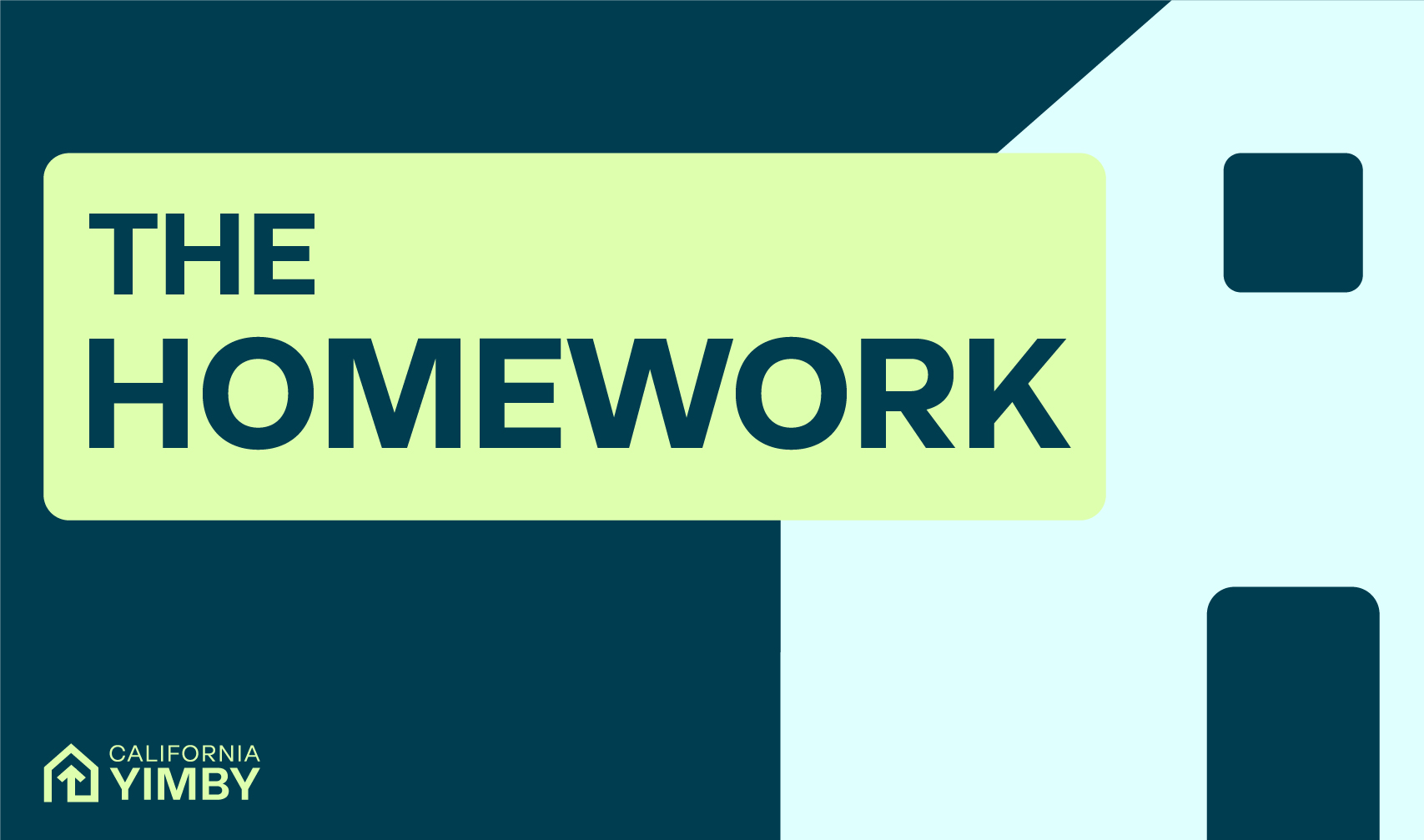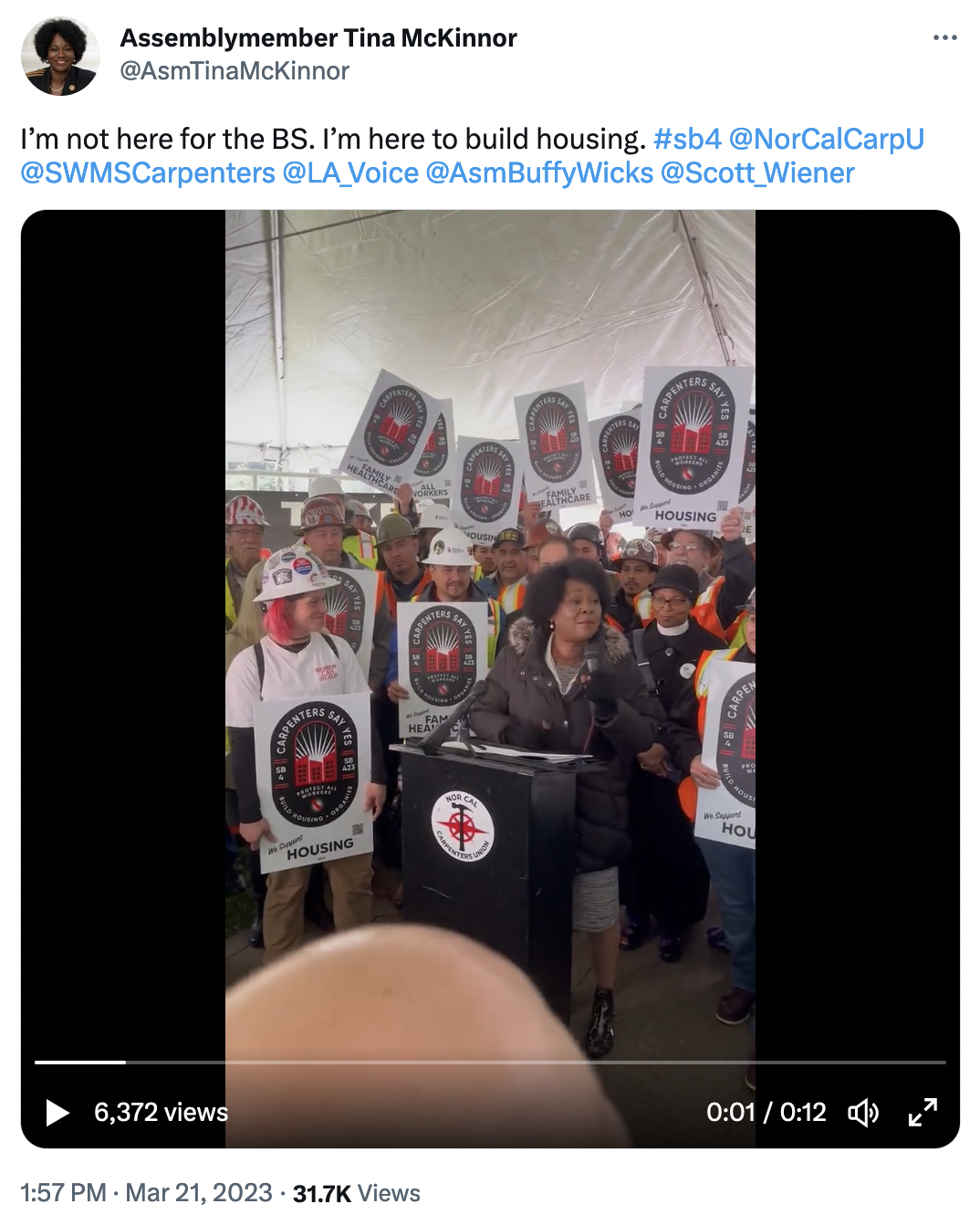The HomeWork: April 3, 2023

Welcome to the April 3, 2023 Main edition of The Homework, the official newsletter of California YIMBY — legislative updates, news clips, housing research and analysis, and the latest writings from the California YIMBY team.
News from Sacramento
The legislative session in Sacramento is in full swing, and our first sponsored bill has moved through its initial committee. SB 423 (Wiener), passed the Senate Housing Committee on a bipartisan vote and will now be heading to the Senate Governance and Finance Committee, expected to be heard on April 19, 2023.
For those hoping to register support for any bills in the upcoming Senate Governance and Finance Committee, the deadline for letters is April 13 at noon* (see below for one important exception for SB 684.)
This week, another California YIMBY sponsored bill, AB 976 (Ting), will be heard in the Assembly Housing Committee. This bill would permanently extend the ability of property owners to build affordable, rental accessory dwelling units (ADUs), by extending the rental unit provisions of 2020’s AB 881, which expire in 2025.
We have also officially launched two new sponsored bills:
- AB 68 (Ward), The Housing and Climate Solutions Act, would help alleviate California’s housing crisis and reduce climate change risk by streamlining approvals for new homes near jobs, schools, transit, and other resources, and in areas local governments have already identified as a priority for infill housing.
- SB 684 (Caballero), would create new pathways to homeownership for middle-income Californians and communities of color by making it faster and easier to build smaller, more naturally-affordable homes near jobs, schools, transit, and other amenities. SB 684 is expected to be heard on April 12 in the Senate Governance and Finance Committee. For those hoping to register support for this bill, the deadline for the letter is this Thursday, April 6 at noon.
Another new bill on our priority list is SB 450 (Atkins), which offers updates and improvements on prior housing legislation championed by California YIMBY – SB 9, which passed in 2021. That bill ended single-unit-only zoning and legalized duplexes and lot-splits throughout California. But many cities have found creative ways to effectively ban the housing made possible by SB 9 in their jurisdictions. SB 450 would strengthen SB 9 by clarifying the intent and purpose of the law, and by giving state agencies the authority to enforce its provisions in cities that try to block it.
To stay current on what housing bills California YIMBY is sponsoring, supporting, and watching, you can now use our Abstract link to track with us.
We will have more housing legislation news in the coming weeks as bills are refined, amended, and scheduled for committee hearings. To stay up to date on committee action, and to receive alerts for bills and other legislative activities, join our Rapid Response team.
Housing Research & Analysis
Capturing the Real Value of Transit-Oriented Development
Over the past few decades, California has made historic investments in urban mass transit, as demand for transit-served neighborhoods has grown. Yet these investments are undermined by poor local planning around transit stations, with zoning codes often blocking the mixed-use, infill housing development that can help capture the full value of public investments in transit.
Worse, the streets around these stations are often hostile to pedestrians, bicyclists, and transit riders. As a result, transit-served communities across California are missing out on the benefits of new transit, which could accommodate much more affordable housing, while reducing traffic pollution and congestion.
In a new report for Circulate San Diego, researchers Jesse O’Sullivan and Colin Parent consider how such barriers affect San Diego’s Mid-Coast Trolley Extension, which provided connections to the University of California San Diego. While focused on this project, their work holds clear implications for transit projects across the state.
Key takeaways:
- Zoning around the proposed Mid-Coast Trolley Extension stations prohibits the mixed-use, infill housing development needed to fully leverage the project.
- Likewise, streets around the proposed Mid-Coast Trolley Extension stations are designed to be hostile to pedestrians and bicyclists.
- The absence of transit-only lanes further defeats the value of these transit investments, since buses often sit stuck in car traffic.
How San Diego Kicked Off an Affordable ADU Building Boom
Thanks to recent YIMBY-backed reforms, California is in the midst of an accessory dwelling unit (ADU – a.k.a. “Granny flats” or “casitas”) building boom. Since 2016, new state rules have clarified and strengthened the rights of property owners to build ADUs and junior ADUs on their property. Since 2019, local governments have been obliged to ensure that some of these ADUs serve households with very low, low, or moderate incomes (via common affordability mechanisms like “deed-restricted” or “income-restricted” housing).
By all measures, the San Diego ADU Bonus Program is the most successful of these programs, stimulating the production of hundreds of ADUs since 2020.
In a new report for the Terner Center for Housing Innovation at UC Berkeley, researchers Muhammad Alameldin and Quinn Underriner explore what went right with San Diego’s ADU Bonus Program, and draw out the lessons for local and state policymakers.
Key takeaways:
- Local governments have an obligation to permit ADUs pursuant to statewide standards, and adopt programs to encourage the production of income-restricted, affordable ADUs.
- Since 2021, the San Diego ADU Bonus Program has allowed property owners to add an additional market-rate ADU for each deed-restricted, affordable ADU added to the property.
- This has facilitated the production of hundreds of deed-restricted and market-rate ADUs in San Diego over the past two years, substantially increasing the supply of housing at all income levels – at no cost to the city.
Houser Headlines
- Opinion: California housing and the environment are often at odds. They don’t have to be | LA Times
- YIMBYs and environmentalists have been at odds on housing. Now they’re teaming up to fight sprawl | SF Chronicle
- Proposed legislation would make it harder to build in wildfire areas in California | Desert Sun
- YIMBYs and Environmentalists Team Up at Last | Planetizen Blogs
- Commentary: Housing and Environmental Needs Don’t Have to Clash | Davis Vanguard
- SF’s Unique Way of Funding Affordable Homes Is Under Attack, From All Sides | The Frisc
- Federal Court Denies Huntington Beach’s Request To Block The State From Enforcing Housing Laws There | LAist
- Sign up for You Do ADU | LA Times
- How the high cost of housing pushed many LAUSD workers to strike | LA Times
- The Planet Can Do Better Than the Electric Car | Slate
YIMBY Social – Top Posts

Share the good word
We welcome your ideas and feedback — send story tips and ideas to Homework@cayimby.org.